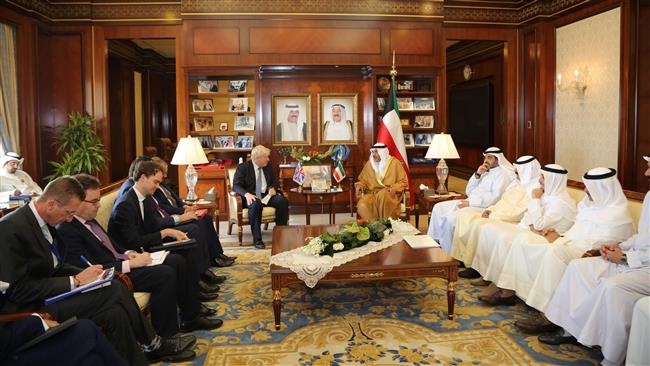Press TV - British Foreign Secretary Boris Johnson has called on Saudi Arabia and its Persian Gulf allies to end their blockade and�siege of Qatar as he continued�his tour of the Persian Gulf.
"What people need to see is de-escalation and progress towards tackling the funding of terrorism in the region, and progress toward an end to this blockade," Johnson said in Kuwait City on Saturday before heading to Qatar.
He further expressed UK�s support for Kuwait�s efforts to broker a solution to the row which is said to be the worst to hit the region�since the formation of the Persian�Gulf Cooperation Council (GCC)�in 1981.
The top British diplomat further described the siege on Qatar as unwelcome but played down the possibility of a military escalation as "highly unlikely�.
"Everybody I have talked to said the opposite. No possibility of a military confrontation," he said.
During his visit to Kuwait, Johnson sat down with Kuwaiti Foreign Minister Sheikh Sabah Al Khalid Al Sabah whose country has played a mediating role in the crisis.
Johnson earlier held meetings with officials from Saudi Arabia and the United Arab Emirates which have the most uncompromising stance in the dispute.
In Doha, Johnson met with Qatari�Emir Sheikh Tamim bin Hamad Al Thani and discussed the crisis as well as ways to enhance counter-terrorism cooperation, according to Qatar's state news agency.
Last month, Saudi Arabia, the United Arab Emirates, Bahrain and Egypt imposed a trade and diplomatic embargo on Qatar, accusing Doha of supporting terrorism.
They presented Qatar with a list of 13 wide-ranging demands and gave it an ultimatum to comply with them or face unspecified consequences.
The demands included shutting down the broadcaster Al Jazeera, removing Turkish troops from Qatar�s soil, scaling back cooperation with Iran and ending ties with Egypt�s Muslim Brotherhood movement, which�Doha refused to comply with.
Qatari Foreign Minister Sheikh Mohammed bin Abdulrahman Al Thani accused the Saudi-led quartet of �clear aggression�, saying they had�enforced�an �illegal blockade� to �try to force us to surrender our sovereignty."
In a joint statement, the bloc�s foreign ministers said they regretted Qatar's "negative" response to their demands and vowed to press ahead with their bid�to isolate Doha.
Erdogan calls for peaceful solution �
Separately on Saturday, Turkish President Recep Tayyip Erdogan said Ankara expected a peaceful solution to the Persian Gulf dispute.
[caption id="" align="aligncenter" width="555"]
 Turkey's President Recep Tayyip Erdogan addresses a final press conference on the second day of the G20 summit in Hamburg, Germany, July 8, 2017. (Photo by AFP)[/caption]
Turkey's President Recep Tayyip Erdogan addresses a final press conference on the second day of the G20 summit in Hamburg, Germany, July 8, 2017. (Photo by AFP)[/caption]�Turkey has brotherly relations with all (Persian) Gulf countries and has used all diplomatic tools to resolve the Qatar crisis,� Erdogan said during a press conference in Hamburg where he was to attend the G20 summit.
He also emphasized that Turkey did not approve of sanctions against Doha, urging�regional countries, particularly Saudi Arabia, to settle the row in a short period of time.
�As I mentioned before, there won't be any winners in the brothers' fight," Erdogan pointed out.











